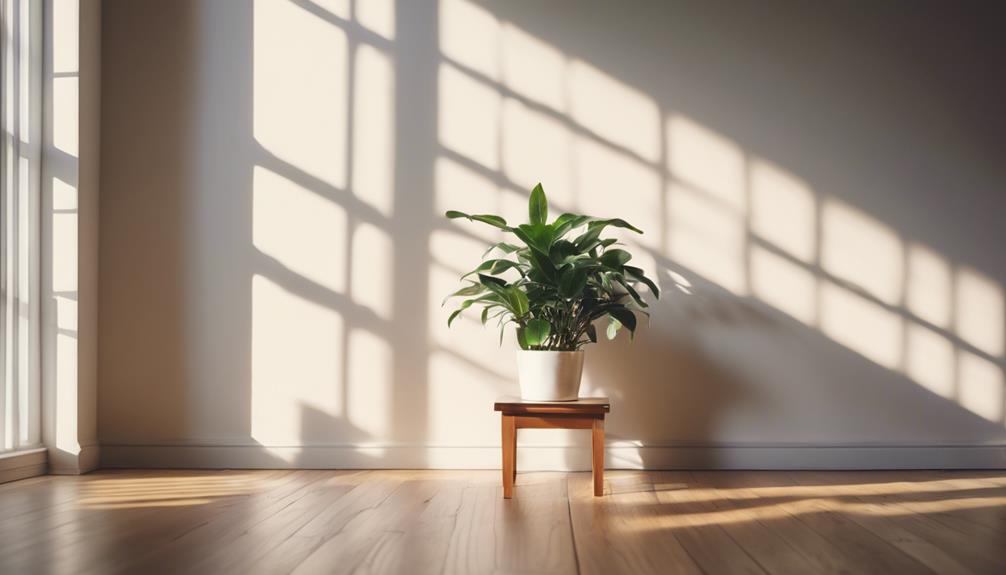A family decides to downsize their home and live with only the essentials, which leads to a significant reduction in energy consumption and waste. This transition towards minimalism not only frees up their living space but also promotes a more sustainable lifestyle.
Embracing fewer possessions fosters a stronger connection to the environment and clarifies personal purpose. However, blending minimalism with sustainable practices can present challenges. For instance, individuals may struggle with letting go of sentimental items or may find it difficult to choose sustainable alternatives for everyday products.
Examining this relationship highlights not just individual benefits but also the wider implications for the planet and local communities. For example, reduced consumption lessens the demand for production, which in turn diminishes resource depletion and pollution.
Furthermore, communities can benefit from the sharing economy, where people exchange or lend items instead of purchasing new ones, promoting both sustainability and community bonding.
Ultimately, the journey toward minimalism and sustainability can lead to a fulfilling lifestyle that respects the environment. Embracing this approach encourages mindful consumption, prioritizing quality over quantity, and fostering a greater appreciation for what truly matters in life.
Defining Minimalism
Minimalism, frequently regarded as a lifestyle choice, underscores the significance of intentional living through the reduction of excess and a focus on what genuinely matters. Embracing aesthetic simplicity allows for the creation of clutter-free environments that promote personal freedom and mental clarity. This mindset encourages purposeful decisions regarding possessions and lifestyle.
Mindful ownership involves emphasizing quality over quantity, which helps cultivate a living space that aligns with your values and aspirations. Letting go of superfluous items not only clears physical space but also enhances emotional well-being.
This journey into minimalism paves the way for creative expression, as it provides more time and energy to engage in activities that resonate with your authentic self.
Furthermore, achieving financial freedom becomes possible when attention shifts from consumerism to intentional living. Investing in experiences rather than material goods enriches life in meaningful ways.
Ultimately, minimalism invites individuals to harmonize their lifestyle with core beliefs, fostering a more fulfilling and purposeful existence. Embracing this approach can lead to a life characterized by clarity, joy, and freedom.
Understanding Sustainability
To truly understand sustainability, it’s essential to recognize what sustainable practices entail and their significance. Resource conservation is crucial for fulfilling our current needs without jeopardizing the resources available for future generations. Embracing these principles allows individuals to make a positive impact on both the environment and their way of life.
Sustainable practices include actions like reducing energy consumption, opting for renewable resources, and minimizing waste. For instance, implementing energy-efficient appliances in your home not only lowers electricity bills but also reduces your carbon footprint. Choosing reusable bags, bottles, and containers can help decrease plastic waste, further contributing to environmental health.
Understanding the importance of sustainability goes beyond individual choices; it has broader implications for communities and ecosystems. When communities adopt sustainable methods, they contribute to healthier environments, which can lead to improved public health and economic stability.
Incorporating sustainable practices into daily life doesn’t have to be overwhelming. Simple changes, such as supporting local farms, using public transportation, and practicing mindful consumption, can significantly enhance your lifestyle while preserving vital resources for future generations.
Defining Sustainable Practices
Sustainable practices involve various actions aimed at minimizing our environmental footprint while enhancing the quality of life for both present and future generations. Incorporating these practices into everyday routines can lead to healthier ecosystems. Choosing eco-friendly options and sustainable materials fosters a transition toward greener technologies.
Here’s a straightforward overview of sustainable practices:
| Practice | Description | Benefits |
|---|---|---|
| Ethical Sourcing | Selecting products from responsible suppliers | Supports fair labor and strengthens local economies |
| Renewable Resources | Utilizing energy from solar, wind, or hydro sources | Decreases dependence on fossil fuels |
| Biodegradable Products | Using items that break down naturally | Reduces waste in landfills |
| Sustainable Agriculture | Implementing farming methods that protect the environment | Enhances biodiversity |
| Resource Efficient Design | Designing products to minimize waste | Promotes recycling and reuse |
Embracing these sustainable practices is critical as they not only protect the environment but also create a more equitable society. For instance, choosing ethically sourced products encourages fair labor practices, while using renewable resources contributes to energy independence. By making small changes in our daily choices, we can collectively make a significant impact on the planet.
Importance of Resource Conservation
Resource conservation is vital for sustainability, as it directly influences our use of the planet’s limited resources. Implementing effective conservation strategies enhances resource management and supports sustainable development. Choosing eco-friendly practices isn’t merely a trend; it represents a commitment to mindful resourcefulness.
Contributing to a circular economy involves prioritizing renewable resources and minimizing waste in your consumption habits. Being conscious of your purchases and their environmental impacts is crucial. Focusing on energy efficiency in your daily life not only helps you save money, but also decreases your carbon footprint.
Responsible consumption requires thoughtful decision-making. Consider whether you genuinely need a new item or if you can repurpose or repair something you already own. Each small choice can lead to significant environmental improvements.
For instance, instead of buying new clothing, consider swapping clothes with friends or shopping at thrift stores. This not only extends the life of garments but also reduces waste.
Opt for energy-efficient appliances, which can lower your utility bills and lessen your impact on the environment. In each action, remember that mindful choices contribute to a healthier planet for future generations.
Historical Context of Minimalism
To fully understand minimalism, it’s essential to examine its origins and the cultural influences that led to its development. This design philosophy arose as a counter to excess, drawing from various art movements and historical circumstances. Recognizing these foundations provides valuable insights into how minimalism advocates for sustainability in contemporary society.
For instance, minimalism can be traced back to movements like the Bauhaus, which emphasized simplicity and functionality in design. This approach sought to eliminate unnecessary elements, focusing instead on the essentials.
Similarly, Japanese aesthetics, particularly the concept of “wabi-sabi,” celebrates imperfection and the beauty of simplicity, further influencing minimalist design.
Origins of Minimalism
Minimalism, often viewed as a lifestyle choice, has historical roots that extend through various movements and cultures. It transcends mere physical space; it represents a philosophy striving for emotional clarity and personal freedom. Its origins can be traced to numerous artistic expressions and design principles that prioritize aesthetic simplicity and intentional living.
The evolution of minimalism can be summarized in the following eras:
| Era/Movement | Key Features |
|---|---|
| Ancient Philosophy | Emphasis on simplicity and virtue |
| Art Movements | Focus on abstraction and form |
| Modern Design | Beauty in functionality and minimal clutter |
| Cultural Evolution | Movement toward sustainability |
| Contemporary Minimalism | Transformation of lifestyle for clarity |
The philosophical foundations of minimalism encourage an exploration of the deeper meanings behind your belongings and environment. Engaging with this movement may lead to a spiritual connection that enhances your life experience. By removing the superfluous, you create space for what genuinely matters, allowing for a richer appreciation of existence. Embracing minimalism can guide you toward a purposeful, fulfilling life.
Cultural Influences on Minimalism
Throughout history, diverse cultures have significantly influenced the principles of minimalism, each contributing unique values and practices. Cultural perspectives play a vital role in shaping minimalist lifestyles, with an emphasis on simplicity and intentionality.
For example, Eastern philosophies often embrace spiritual aspects, fostering mindfulness and a profound connection to the present moment. In contrast, Western artistic movements, such as Bauhaus, championed clean lines and functional design, mirroring societal values that prioritize efficiency and clarity.
The global variations of minimalism showcase intriguing ethnic interpretations, where different traditions express simplicity in their own distinctive ways. Modern adaptations of minimalism frequently weave in these diverse influences, resulting in lifestyle changes that align with a quest for freedom and authenticity.
Embracing minimalism can help individuals liberate themselves from the burdens of consumerism, paving the way for a more meaningful existence. This transformation is important because it not only encourages individuals to reassess their possessions but also fosters a deeper understanding of what truly brings joy and fulfillment.
As one simplifies their environment, they may discover a renewed sense of purpose, allowing for a more intentional way of living.
Environmental Impact of Consumerism
Consumerism significantly influences the future of our planet. In a society captivated by material wealth, the environmental consequences of our buying habits often go overlooked. Every purchase contributes to waste and depletes resources, impacting not only individual lives but also the health of the Earth. The pervasive nature of advertising fuels a cycle of incessant consumption that can be difficult to escape.
However, there are alternatives to this cycle. Ethical consumption involves actively choosing to be aware of how consumerism affects your mental and emotional well-being. Making lifestyle adjustments, such as opting for sustainable products, can alleviate some of the pressures of this pervasive consumer culture. Supporting brands that prioritize social and environmental responsibility aligns your values with your purchasing decisions, promoting a healthier planet.
Recognizing the environmental impact of your choices empowers you to enact change. Each time you decide against unnecessary purchases, you contribute to reducing waste and conserving resources. This conscious effort helps to cultivate a future that values freedom while also nurturing a sustainable environment for future generations.
Consider products like reusable bags, biodegradable utensils, and locally sourced foods as practical steps toward making a positive impact. Embracing these choices not only benefits you but also fosters a community focused on sustainability.
Minimalism as a Lifestyle Choice
Embracing minimalism as a lifestyle choice serves as a strong response to the overpowering influence of consumerism. By engaging in mindful living, you can make deliberate decisions that reflect your core values. This transformation allows you to focus on what genuinely matters, resulting in significant decluttering benefits for both your physical environment and mental clarity.
As you embark on this journey, you’ll discover that optimizing your space soon becomes instinctive. You’ll experience liberation by releasing excess belongings that hold you back, creating a setting that fosters emotional health. This lifestyle change not only reduces clutter but also enhances financial stability, as you learn to resist the temptation of accumulating superfluous items.
Furthermore, minimalism enhances mental clarity, empowering you to pursue your goals and interests without distractions. With increased awareness about consumer choices, you become more selective about what enters your life, ensuring that every item has a meaningful purpose. Ultimately, minimalism allows you to design a life filled with significance and simplicity, freeing you from the constraints of consumerism and guiding you toward a more rewarding existence.
For those looking to start this journey, consider practical steps such as creating a capsule wardrobe, which consists of versatile clothing items that can be mixed and matched, or investing in multifunctional furniture that maximizes space.
These specific choices can further enrich your minimalist lifestyle, making it easier to maintain a clutter-free environment.
Benefits of Sustainable Living
Sustainable living presents a variety of advantages that can significantly enhance both your life and the environment. Embracing eco-friendly practices not only benefits the planet but also improves your personal well-being. For example, reducing energy consumption can lead to lower utility bills, while choosing reusable products minimizes the need for frequent replacements, ultimately saving you money.
Adopting a sustainable lifestyle promotes simplicity, enabling you to concentrate on what’s truly important. As you declutter your surroundings and lessen your reliance on material goods, you may experience a newfound sense of liberation. This transformation can lead to a more satisfying life, where meaningful experiences are valued over excessive consumption.
In addition, living sustainably connects you with a community of individuals who share similar values, fostering a sense of belonging and collective purpose. Engaging with this community can provide support on your journey toward an eco-friendly lifestyle, enhancing your social interactions and motivating others to join in.
Integrating sustainable habits into your daily routine not only enriches your life but also ensures a healthier planet for future generations. Embrace the empowerment that comes with making environmentally conscious choices today!
Reducing Waste Through Minimalism
Minimalism aligns seamlessly with sustainable living by emphasizing waste reduction and life simplification. Embracing a minimalist lifestyle encourages eco-friendly choices that significantly cut down on waste. Intentional purchasing becomes instinctive, allowing you to select quality items that serve a clear purpose rather than accumulating unnecessary clutter.
Sustainable habits foster clutter-free environments that encourage mindful living. Each possession should hold value, prompting thoughtful decluttering. As you release items that no longer serve you, you’ll experience a sense of liberation that complements a waste-free approach. This process not only clears your physical space but also enhances your mental clarity.
At the core of minimalism is the principle of resource efficiency. When you concentrate on what truly matters, you decrease consumption and lessen your environmental footprint. This change can inspire those around you to consider a similar mindset. By focusing on essential items, you play a role in building a more sustainable future, demonstrating that having less can lead to greater fulfillment.
Embrace minimalism to foster a life that isn’t only lighter but also rich in purpose and connection. For practical application, consider investing in high-quality, multi-functional products such as a durable, reusable water bottle or versatile storage solutions that reduce the need for disposable items. These choices exemplify how intentional purchasing can make a positive impact on both your life and the planet.
Minimalism and Ecological Footprint
Adopting minimalism means actively reducing your resource use and making thoughtful decisions about your purchases. This mindset simplifies your life while enhancing your ability to manage waste more effectively. Focusing on what genuinely matters allows you to significantly decrease your ecological footprint.
For instance, consider the impact of opting for quality over quantity when choosing clothing. By selecting durable, versatile pieces, you not only minimize the number of items in your wardrobe but also reduce the demand for fast fashion, which contributes heavily to environmental degradation.
Similarly, when you prioritize experiences over material possessions, such as spending time with loved ones or engaging in outdoor activities, you foster meaningful connections while leaving a lighter environmental impact.
Transitioning to a minimalist lifestyle encourages you to evaluate your needs critically. This process might involve decluttering your home, opting for sustainable products, or even embracing digital solutions to cut down on physical items.
Each of these actions contributes to a more sustainable way of living, highlighting the importance of conscious consumerism in reducing waste and preserving our planet for future generations.
Reducing Resource Consumption
Embracing a minimalist lifestyle can significantly lower your ecological footprint. When you prioritize resource efficiency, you incorporate mindful living into your daily habits. Every deliberate decision you make—such as what to purchase or how to utilize resources—plays a role in transforming your lifestyle toward sustainability.
To cultivate eco-friendly habits, practice intentional purchasing by selecting products that reflect your values. This approach minimizes negative impacts on the environment and promotes ethical consumption, ensuring your choices support the health of the planet.
Here’s a concise overview of the advantages of reducing resource consumption:
| Action | Result | Impact |
|---|---|---|
| Buy less | Generates less waste | Decreases use of landfills |
| Choose quality | Results in longer-lasting items | Lowers overall resource consumption |
| Opt for digital solutions | Reduces the need for physical products | Conserves valuable resources |
| Repair rather than replace | Extends the lifespan of products | Minimizes waste and consumption |
| Share or borrow | Results in fewer owned items | Promotes community resource sharing |
Simplifying Waste Management
Simplifying waste management is vital for reducing your ecological footprint and promoting a sustainable lifestyle. Adopting waste reduction strategies empowers you to live in harmony with your values.
Start with eco-friendly practices, such as composting, which converts organic waste into nutrient-rich soil. This enriches your garden and minimizes landfill contributions.
Consider the principles of a circular economy that advocate for reusing and recycling materials. When shopping, opt for products with minimal packaging, as they tend to be more sustainable. Engage in community recycling programs to ensure your waste is disposed of responsibly.
Join zero waste initiatives that encourage a lifestyle focused on minimizing waste. Instead of discarding items, extend their lifespan through repairs. This approach not only saves money but also reduces the demand for new products, which can be resource-intensive.
Look into urban waste solutions tailored to your community’s needs. This helps create a shared environment where everyone can benefit from reduced waste.
Simplifying waste management in these various ways allows you to lessen your ecological impact while inspiring others to adopt a more sustainable and minimalist lifestyle. Your actions make a difference and contribute to a healthier planet.
Mindful Consumption Practices
Mindful consumption practices are crucial for promoting sustainability and minimizing waste. Embracing intentional purchasing allows you to make choices that align with your values and support a healthier environment. This approach emphasizes quality over quantity, encouraging you to select eco-friendly products that provide lasting benefits rather than temporary gratification.
When it comes to mindful gifting, the effects of your choices are significant. Selecting gifts that prioritize sustainable sourcing and ethical production not only brings joy to the recipient but also fosters a culture of conscious decision-making. Each gift can either aid in reducing waste or contribute to a larger problem, so it’s important to choose wisely.
Minimalist budgeting serves as an effective strategy in this endeavor. By directing your financial resources toward durable products, you can break the cycle of frequent buying and disposal. Rather than accumulating unnecessary items, focus on acquiring goods that genuinely enhance your quality of life and overall well-being.
For example, consider investing in a high-quality reusable water bottle made from stainless steel. This choice not only reduces reliance on single-use plastic but also promotes hydration in a stylish and sustainable way.
Such thoughtful decisions reflect a commitment to mindful consumption and can inspire others to follow suit.
Ethical Production and Minimalism
When considering ethical production, it’s essential to recognize how your choices affect both the environment and society. Conscious consumption can significantly lower waste levels while supporting brands committed to sustainability.
Embracing minimalism involves more than just reducing your belongings; it requires making more informed and intentional choices in your life. For instance, opting for products made from recycled materials or supporting local artisans can have a positive impact.
Brands like Patagonia, known for their environmental efforts, and Everlane, which practices transparent pricing and production, exemplify how businesses can prioritize ethical practices. By being mindful of what you purchase, you contribute to a more sustainable future.
Moreover, minimalism encourages a lifestyle that values quality over quantity. Instead of accumulating items that may only be used once, investing in versatile, durable products can enhance your everyday life.
For example, choosing a high-quality backpack that suits various occasions is a more thoughtful decision than repeatedly buying cheaper alternatives.
Conscious Consumption Practices
Conscious consumption isn’t just a passing trend; it represents a lifestyle choice that focuses on making informed purchasing decisions. When you choose products that are ethically sourced, you ensure that your purchases support fair labor practices and sustainable methods. This approach requires you to assess your genuine needs against your wants, promoting a thoughtful approach to spending.
Committing to a conscious lifestyle means prioritizing choices that align with your personal values. This involves selecting eco-friendly products designed to minimize environmental harm, allowing you to contribute meaningfully to waste reduction efforts. Consuming based on your values enables you to invest in items that enhance your life while staying true to your principles.
This mindset can also spark frugal innovation, leading to creative solutions that reduce consumption without compromising quality. For instance, consider buying multi-functional items or high-quality products that offer longevity.
Reducing Waste Impact
Reducing waste impact is vital for living sustainably, and ethical production significantly influences this effort. Embracing a minimalist mindset can help you develop eco-friendly habits that encourage resourceful living. Begin making thoughtful purchases that emphasize ethical consumption and effective waste management practices.
Consider the following table as a guide on your journey to achieving zero waste:
| Action | Impact |
|---|---|
| Conscious Decluttering | Reduces clutter and minimizes waste |
| Mindful Disposal | Ensures recycling and repurposing |
| Sustainable Sourcing | Promotes ethical production methods |
Engaging in conscious decluttering not only creates a more organized space but also lowers your environmental footprint. Focusing on mindful disposal helps keep items out of landfills, allowing materials to be recycled or reused effectively. Incorporating these practices into your daily routine fosters a sustainable lifestyle that aligns with your values.
Every small change you make has significance. Transitioning to a more intentional way of living frees you from excess and benefits the planet. Implement these strategies, and you will contribute to a healthier world while enjoying the simplicity that minimalism provides.
For instance, consider donating unused items to local charities or community centers instead of discarding them. Choose products with minimal packaging or those made from recycled materials to support sustainable sourcing. By taking these actions, you not only enhance your life but also help safeguard the environment for future generations.
The Role of Decluttering
Decluttering has the potential to significantly enhance both your living space and your mental state. When you eliminate unnecessary items, you create space for what truly matters, aligning your surroundings with your core values. As you simplify your environment, you may experience a notable decrease in decision fatigue, leading to clearer thoughts and greater mental clarity. This shift towards intentional living encourages lifestyle changes that not only offer a sense of freedom but also promote environmental consciousness, as you become more aware of your consumption habits.
Optimizing your space can also lead to improved time management. The hours once dedicated to managing clutter can now be spent on activities that bring you joy and fulfillment. With fewer distractions, you can concentrate on what truly matters to you. Financial benefits often follow this process, as you start making more mindful purchasing choices, focusing on quality items rather than accumulating more.
Decluttering transcends mere physical organization; it represents a journey into embracing a minimalist mindset. As you let go of emotional attachments to items that no longer serve a purpose in your life, you may discover a lighter, more liberated version of yourself. This journey reinforces your dedication to sustainability, as adopting a minimalist lifestyle naturally results in less waste and a more thoughtful approach to what you consume.
Embracing the power of decluttering can lead to a more authentic and fulfilling life. For example, investing in multifunctional furniture or storage solutions can help maintain a tidy space while accommodating your needs.
Consider sourcing eco-friendly products that align with your values, further enhancing the positive impact of your decluttering efforts. Ultimately, the journey of decluttering is about creating a life that reflects who you’re and what you value most.
Sustainable Fashion and Minimalism
Sustainable fashion is part of a growing movement that aligns closely with the principles of minimalism, emphasizing the importance of quality over quantity. Choosing eco-friendly fabrics and supporting ethical brands allows you to create a wardrobe that feels good and helps protect the planet.
Consider assembling a capsule wardrobe filled with timeless pieces that transition effortlessly from season to season, reducing the clutter of fast fashion.
Thrift shopping offers a fantastic opportunity to find unique items while also minimizing waste. Each thrifted piece can bring distinct character to your mindful wardrobe, enabling you to showcase your individuality without compromising your values.
Engaging with slow fashion means investing in sustainable accessories made from upcycled materials, ensuring that every item you own serves a purpose.
As you curate your conscious closet, focus on versatility and durability rather than temporary trends. When you prioritize fewer, high-quality garments, you gain the freedom to mix and match with ease, allowing your personal style to shine.
Embracing sustainable fashion is more than just a trend; it represents a lifestyle choice that empowers you to create a positive impact. Adopting minimalism in your fashion selections leads to a more sustainable future, offering a liberating journey that reflects your values.
Minimalism in Home Design
Minimalism in home design fosters a tranquil atmosphere that prioritizes simplicity and practical use of space. Focusing on essential components can enhance your living environment, promoting a sense of openness and tranquility. Emphasizing functional furniture, spacious layouts, and thoughtful arrangements enables you to create a home that balances comfort and efficiency seamlessly.
Here’s a reference table to guide you on your minimalist journey:
| Element | Benefits |
|---|---|
| Functional Furniture | Optimizes utility and maximizes space |
| Natural Materials | Supports eco-friendly living |
| Color Palettes | Establishes a light, airy aesthetic |
| Indoor Plants | Enhances visual balance and calm |
| Multifunctional Design | Allows for personal creativity |
Incorporating functional furniture is essential for making the most of your space. Pieces like modular sofas or extendable dining tables adapt to your needs without cluttering the room. Using natural materials such as wood, stone, and bamboo not only promotes durability but also aligns with a sustainable lifestyle.
Selecting a cohesive color palette can transform the feel of your space. Soft neutrals or pastel tones invite light and warmth, creating an inviting atmosphere. Indoor plants, like snake plants or pothos, can greatly improve air quality while adding a touch of nature to your decor.
Multifunctional design is key in a minimalist home. Consider furniture that serves multiple purposes, such as a coffee table with storage or a bed with built-in drawers. This approach not only saves space but also encourages a personalized touch in your decor.
Digital Minimalism and Sustainability
In an era where technology plays a central role in our lives, practicing digital minimalism can significantly enhance your sustainable living efforts. Intentional technology use allows you to minimize your digital impact and fosters a more thoughtful online experience. Here are three effective strategies to implement:
1. Digital Detox: Allocate specific times to step away from screens, allowing your mind and body to rejuvenate. This practice reduces the chaos often created by constant connectivity and nurtures your overall digital health.
For instance, consider setting aside one day a week to unplug from all devices and engage in activities like reading, walking in nature, or connecting face-to-face with loved ones.
2. App Decluttering: Periodically review the applications installed on your devices. Retain only those that fulfill a genuine need or contribute positively to your life.
This not only promotes a more sustainable tech environment but also minimizes distractions, ultimately leading to decreased screen time. For example, if you find several similar apps for task management, choose the one that best suits your workflow and delete the rest.
3. Mindful Digital Consumption: Pay attention to the content you interact with online. Opt for media that reflects your values and supports a sustainable lifestyle.
This could involve following eco-conscious influencers on social media, subscribing to newsletters focused on sustainability, or watching documentaries that raise awareness about environmental issues. Engaging with such content can inspire and motivate you to make more sustainable choices in your own life.
Community Impact of Minimalist Living
Embracing minimalist living can have a profound impact on your community, fostering connections and promoting shared values. When you simplify your life, you may motivate others to adopt similar practices, nurturing a mindful environment where everyone can flourish.
Engaging in community gardening not only provides fresh produce but also builds relationships and encourages the sharing of resources, benefiting all participants.
Taking part in local initiatives, such as neighborhood swaps, allows you to exchange items you no longer use, which fosters collaborative consumption and minimizes waste. These gatherings not only support eco-friendly habits but also strengthen the ties within the community.
Participating in community cleanups enhances the beauty of your surroundings while demonstrating a unified commitment to sustainability.
Hosting sustainable workshops offers a platform to share valuable skills and knowledge, whether you’re teaching upcycling techniques or ways to reduce waste. Promoting cooperative ownership of tools and resources creates a system where everyone can contribute and receive benefits.
Collectively, these activities cultivate a vibrant atmosphere that prioritizes simplicity and sustainability, helping you feel more connected and liberated in your daily life. Embrace this transformation and witness your community thrive.
Challenges of Combining Approaches
Blending minimalism and sustainability can be a complex journey, requiring careful consideration of both philosophies. Here are three significant challenges you may encounter:
1. Philosophical Dilemmas: The moral implications of owning fewer items can create a conflict with the necessity of making responsible consumption choices. Striking a balance between these two principles is crucial for a fulfilling lifestyle.
2. Lifestyle Conflicts: Societal expectations can put pressure on you to maintain certain possessions, which may not align with your sustainable goals. This can lead to emotional attachments to items that don’t serve a purpose in your life.
Recognizing these attachments and understanding their impact is essential for moving forward.
3. Economic Implications: The pursuit of sustainability often demands personal sacrifices that may feel financially burdensome. Consumer culture frequently promotes excess, making it difficult to prioritize sustainable choices without feeling a financial strain.
As you work through these challenges, remember that your decisions influence not only your life but also the wider cultural and environmental landscape.
Acknowledging cultural barriers can facilitate your growth in this area. Embracing minimalism offers a sense of freedom, but it often requires you to confront and change long-standing habits and beliefs.
Being aware of your emotional ties to possessions will help you assess their relevance to your sustainable aspirations.
Ultimately, successfully combining minimalism and sustainability calls for courage, resilience, and a commitment to challenging conventional norms.
Future Trends in Minimalism and Sustainability
As awareness of sustainable living grows, minimalism is adapting to address these needs in new and creative ways. Future innovations are fostering a lifestyle where eco-friendly design takes the forefront.
Urban minimalism is gaining traction, emphasizing clean lines and environmentally friendly materials that enhance your space while minimizing waste.
Mindful technology is crucial in this transformation, enabling automation of everyday tasks and facilitating more thoughtful decisions without compromising personal freedom.
The trend of collaborative consumption promotes resource sharing, builds community connections, and reduces individual consumption. This transition toward a circular economy encourages sustainable travel, prioritizing experiences over material possessions, allowing for exploration without environmental harm.
The concept of conscious gifting is also on the rise, with individuals opting for meaningful, sustainable gifts that align with their values.
Experiential living focuses on creating memorable moments rather than amassing belongings, which resonates deeply with minimalist principles.
These interconnected trends empower individuals to adopt a lighter lifestyle while fostering a culture of environmental respect.
As you embark on this journey, you’ll discover that genuine freedom is rooted in both simplicity and sustainability.
Conclusion
Embracing minimalism goes beyond simply clearing out your space; it represents a significant commitment to sustainability. When you prioritize quality over quantity, you actively contribute to reducing waste and minimizing your ecological footprint. This choice not only benefits your immediate surroundings but also fosters a healthier planet for future generations. Making mindful decisions about what you own and consume can lead to a more significant impact on your community and the world at large. As you adopt this intentional lifestyle, you may discover that having less can actually lead to greater clarity, purpose, and influence in your life.
For instance, consider investing in high-quality, sustainable products rather than cheap, disposable items. A durable, eco-friendly backpack can last for years, eliminating the need for frequent replacements, while a minimalist wardrobe with versatile, timeless pieces can reduce clutter and help you make more thoughtful fashion choices. These small, conscious decisions can create a ripple effect, inspiring others to reflect on their consumption habits as well.















